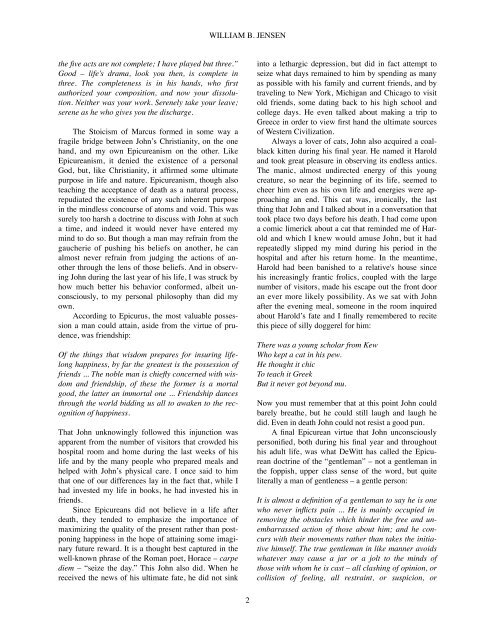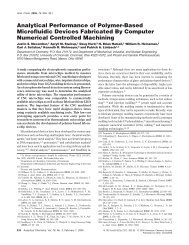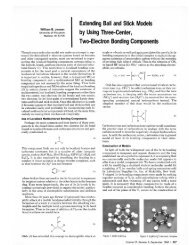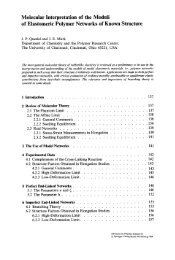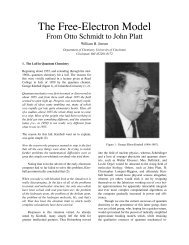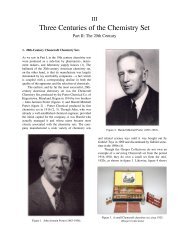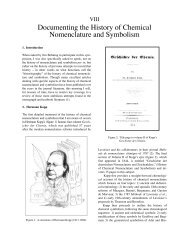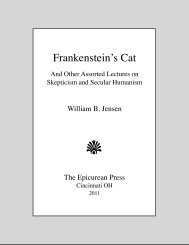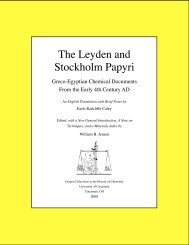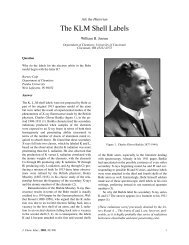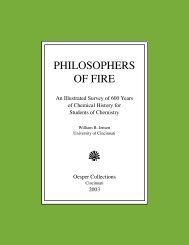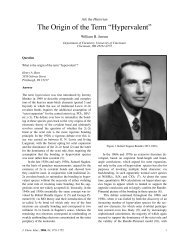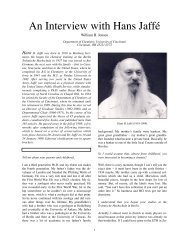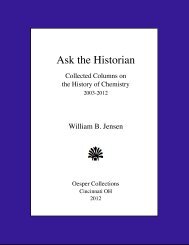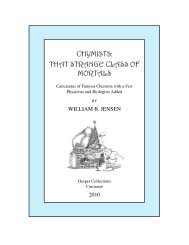099 John Alexander .pdf - University of Cincinnati
099 John Alexander .pdf - University of Cincinnati
099 John Alexander .pdf - University of Cincinnati
Create successful ePaper yourself
Turn your PDF publications into a flip-book with our unique Google optimized e-Paper software.
WILLIAM B. JENSEN<br />
the five acts are not complete; I have played but three.”<br />
Good – life’s drama, look you then, is complete in<br />
three. The completeness is in his hands, who first<br />
authorized your composition, and now your dissolution.<br />
Neither was your work. Serenely take your leave;<br />
serene as he who gives you the discharge.<br />
The Stoicism <strong>of</strong> Marcus formed in some way a<br />
fragile bridge between <strong>John</strong>’s Christianity, on the one<br />
hand, and my own Epicureanism on the other. Like<br />
Epicureanism, it denied the existence <strong>of</strong> a personal<br />
God, but, like Christianity, it affirmed some ultimate<br />
purpose in life and nature. Epicureanism, though also<br />
teaching the acceptance <strong>of</strong> death as a natural process,<br />
repudiated the existence <strong>of</strong> any such inherent purpose<br />
in the mindless concourse <strong>of</strong> atoms and void. This was<br />
surely too harsh a doctrine to discuss with <strong>John</strong> at such<br />
a time, and indeed it would never have entered my<br />
mind to do so. But though a man may refrain from the<br />
gaucherie <strong>of</strong> pushing his beliefs on another, he can<br />
almost never refrain from judging the actions <strong>of</strong> another<br />
through the lens <strong>of</strong> those beliefs. And in observing<br />
<strong>John</strong> during the last year <strong>of</strong> his life, I was struck by<br />
how much better his behavior conformed, albeit unconsciously,<br />
to my personal philosophy than did my<br />
own.<br />
According to Epicurus, the most valuable possession<br />
a man could attain, aside from the virtue <strong>of</strong> prudence,<br />
was friendship:<br />
Of the things that wisdom prepares for insuring lifelong<br />
happiness, by far the greatest is the possession <strong>of</strong><br />
friends ... The noble man is chiefly concerned with wisdom<br />
and friendship, <strong>of</strong> these the former is a mortal<br />
good, the latter an immortal one ... Friendship dances<br />
through the world bidding us all to awaken to the recognition<br />
<strong>of</strong> happiness.<br />
That <strong>John</strong> unknowingly followed this injunction was<br />
apparent from the number <strong>of</strong> visitors that crowded his<br />
hospital room and home during the last weeks <strong>of</strong> his<br />
life and by the many people who prepared meals and<br />
helped with <strong>John</strong>’s physical care. I once said to him<br />
that one <strong>of</strong> our differences lay in the fact that, while I<br />
had invested my life in books, he had invested his in<br />
friends.<br />
Since Epicureans did not believe in a life after<br />
death, they tended to emphasize the importance <strong>of</strong><br />
maximizing the quality <strong>of</strong> the present rather than postponing<br />
happiness in the hope <strong>of</strong> attaining some imaginary<br />
future reward. It is a thought best captured in the<br />
well-known phrase <strong>of</strong> the Roman poet, Horace – carpe<br />
diem – “seize the day.” This <strong>John</strong> also did. When he<br />
received the news <strong>of</strong> his ultimate fate, he did not sink<br />
into a lethargic depression, but did in fact attempt to<br />
seize what days remained to him by spending as many<br />
as possible with his family and current friends, and by<br />
traveling to New York, Michigan and Chicago to visit<br />
old friends, some dating back to his high school and<br />
college days. He even talked about making a trip to<br />
Greece in order to view first hand the ultimate sources<br />
<strong>of</strong> Western Civilization.<br />
Always a lover <strong>of</strong> cats, <strong>John</strong> also acquired a coalblack<br />
kitten during his final year. He named it Harold<br />
and took great pleasure in observing its endless antics.<br />
The manic, almost undirected energy <strong>of</strong> this young<br />
creature, so near the beginning <strong>of</strong> its life, seemed to<br />
cheer him even as his own life and energies were approaching<br />
an end. This cat was, ironically, the last<br />
thing that <strong>John</strong> and I talked about in a conversation that<br />
took place two days before his death. I had come upon<br />
a comic limerick about a cat that reminded me <strong>of</strong> Harold<br />
and which I knew would amuse <strong>John</strong>, but it had<br />
repeatedly slipped my mind during his period in the<br />
hospital and after his return home. In the meantime,<br />
Harold had been banished to a relative's house since<br />
his increasingly frantic frolics, coupled with the large<br />
number <strong>of</strong> visitors, made his escape out the front door<br />
an ever more likely possibility. As we sat with <strong>John</strong><br />
after the evening meal, someone in the room inquired<br />
about Harold’s fate and I finally remembered to recite<br />
this piece <strong>of</strong> silly doggerel for him:<br />
There was a young scholar from Kew<br />
Who kept a cat in his pew.<br />
He thought it chic<br />
To teach it Greek<br />
But it never got beyond mu.<br />
Now you must remember that at this point <strong>John</strong> could<br />
barely breathe, but he could still laugh and laugh he<br />
did. Even in death <strong>John</strong> could not resist a good pun.<br />
A final Epicurean virtue that <strong>John</strong> unconsciously<br />
personified, both during his final year and throughout<br />
his adult life, was what DeWitt has called the Epicurean<br />
doctrine <strong>of</strong> the “gentleman” – not a gentleman in<br />
the foppish, upper class sense <strong>of</strong> the word, but quite<br />
literally a man <strong>of</strong> gentleness – a gentle person:<br />
It is almost a definition <strong>of</strong> a gentleman to say he is one<br />
who never inflicts pain ... He is mainly occupied in<br />
removing the obstacles which hinder the free and unembarrassed<br />
action <strong>of</strong> those about him; and he concurs<br />
with their movements rather than takes the initiative<br />
himself. The true gentleman in like manner avoids<br />
whatever may cause a jar or a jolt to the minds <strong>of</strong><br />
those with whom he is cast – all clashing <strong>of</strong> opinion, or<br />
collision <strong>of</strong> feeling, all restraint, or suspicion, or<br />
2


